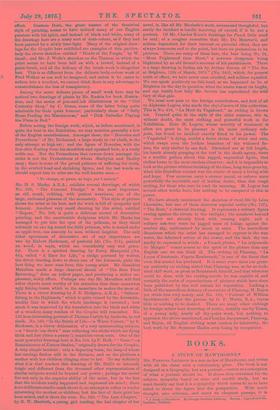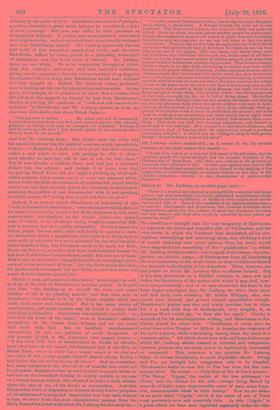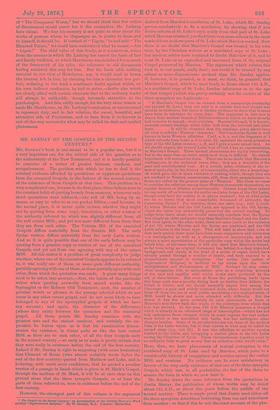BOOKS.
A STUDY OF HAWTHORNE.*
MR. PARSONS LaTnnop is a son-in-law of Hawthorne, and writes with all the claim such a relationship gives. The book is not designed as a biography, but as a portrait, —rather as a conception of what a portrait should be. It shows deep reverence for the subject, sympathy based on close and careful study, but we must frankly say that it is a sympathy which seems to us to have failed to throw the figure into due perspective. With much thought, nice criticism, and many an eloquent passage, it Is • A Study of Hawthorne. By George Parsons Lathrop. Boston: Osgood and 00. London: TrUbner. vitiated by the point of view. Hawthorne was a kind of paragon, a perfect character, a great artist because he was already a kind of ideal personage. But men may suffer by their goodness as
biographical subjects. A perfect man were a monster, an isolated and helpless being ; and no one would have more heartily endorsed
this than Hawthorne himself. Mr. Lathrop apparently has not laid hold of this somewhat paradoxical truth, and therefore Hawthorne suffers by being placed in a prevailing white-light of admiration, and the book loses in interest. Mr. Lathrop harps on one string. He is by implication throughout rebut- ting this nobody's criticisms, and that nobody's criticisms, giving one the impression that the volume is a kind of apology for Hawthorne's life,—a thing that Hawthorne would have detested the very thought of. Indeed, Mr. Lathrop comes perilously near to making out his case by misquotation and omissiOn. At one place, for example, he is concerned to show that a certain critic did not have the support he fancied he had from Hawthorne's diaries, as proving the existence of "cold and self-removed ob- servation " in Hawthorne, and Mr. Lathrop quotes, as from the American Note-Books, this about Brook Farm :— " Nothing here is settled My mind will not be abstracted.
I must observe and think and feel, and content myself with catching glimpses of things that may be wrought out hereafter. Perhaps it will be quite as well that I find myself unable to set seriously about literary work for the present."
And here Mr. Lathrop stops. But clearly what the critic laid his special stress on was the omitted sentence which immediately follows :—" Meantime, I shall see these people and their enterprise under a new point of view, and perhaps be able to deter- mine whether we have any call to cast in our lot with them." But he was already a resident there, and had put a thousand dollars into the scheme ; and though it is quite true that the joining Brook Farm did not imply a yielding up of all indi- vidual purpose, yet a certain esprit de corps was assumed which, unless under peculiar circumstances of constitution, would hardly justify one who had seriously joined the enterprise in deliberately assuming the position of one disconnected with it, and speaking as a third person of "seeing these people and their enterprise."
Indeed, if we were to acquit Hawthorne of something of this "cold, self-removed observation," some violence would be done to his sense of comradeship, in not a few of the sentences in that most characteristic introduction to the Scarlet Letter—the cynical tone of which, on Mr. Lathrop's theory, would be somewhat diffi- cult to account for, or to justify adequately. It was because the Salem people did not make, and could hardly be expected to make, the allowances which a sympathetic critic feels it to be his duty to start with, in reference to a work produced by one who has here- tofore benefited him, that allowance needs to be made for Haw- thorne on this very ground,—that from constitutional reasons he had been beside these Custom-House people, but was not of them. Hawthorne wrote that he "thought be had been exceedingly good- natured in his treatment of them," but the fact remains that they, the parties most concerned, did not think so, and that there was a sort of civic clamour against him.
Of this "cold, self-removed observation "much might be said, as it lay at the root of Hawthorne's peculiar genius. It is quite true that "the holding-up to oneself the stern and secret realities of life is no pleasing pursuit," and that such men as Hawthorne "are driven to it by the divine impulse which has made them seem and recorders." But it has many modes of manifestation, and much interest may be found in noting their individual peculiarities. Hawthorne was certainly reserved ; he rode well his horse of the night," even at Emerson's aesthetic tea-parties, as Mr. Curtis bears witness, and no one could find fault with that ; but to facilitate unembarrassed observation, he was not guiltless of small deceptions, as this passage (found in Mr. Lathrop's own pages) proves :— " It has been told that at leisure-times he would sit silently, hour after hour, in the broad, old-fashioned hall of the Hive, at Brook Farm, where he could listen almost unseen to the chat and merriment of the young people, himself almost always holding a book before him, but seldom turning the leaves." And we remember, too, many instances in the Note-Books of remarks that could not be otherwise designated than as semi-cynical on people whom he had met on the friendliest footing in society, notably in the case of a certain famous actress, who chanced to make a small mistake about the date of one of his books in conversation. And that this peculiar habit of disguising an interest keenly felt for purposes of unembarrassed hearing and observation was very early formed in him, we learn from this most characteristic passage from the Early Notes of his youth with which Mr. Lathrop has favoured us:— " A pedlar, named Dominicus Jordan, was to-day in Uncle Richard's- store, telling a ghost-story. I listened intently, but tried not to seem interested. The story was of a house, the owner of which was suddenly killed. Since his death, the west garret window cannot be kept closed ; though the shutters be hasped and nailed at night, they are invariably found open next morning, and no one can tell when or how the nails, were drawn. There is also on the farm an apple-tree, the fruit of which the owner was particularly fond of, but since his death no one has been able to get one of the apples. The tree hangs full nearly every year, but whenever any individual tries to get one, stones come in all direc- tions, as if from some secret battery or hidden catapult, and more than once have those making the attempts been struck. What ismore strange, the tree stands in an open field, there being no shelter near from which tricks can be played without exposure. Jordan says that it seems odd to strangers to see that tree loaded with apples when the snow is four feet deep ; and what is a mystery, there are no apples in the spring, no one ever sees the wind blow one off, none are seen on the snow, nor even the vestige of one on the grass under the tree ; and that children may play on the grass, under and around it, while it is in blossom, and until the fruit is large enough to tempt them, with perfect safety; but the moment one of the apples is sought for, the air is full of flying stones. He further says that late one starlight night, he was passing the house, and looking up, saw the phantom walk out of the garret-window with cane in hand, making all the motions as if walking on terra firma, although what ap- peared to be his feet were at least six yards from the ground ; and so he went on walking away on nothing, and when nearly out of sight, there was a great flash, and an explosion as of twenty field-pieces, tben,—no- thing. This story was told with seeming earnestness, and listened to as though it was believed. How strange it is that almost all persons, old or young, are fond of hearing about the supernatural, though it produces nervousness and fear 1 I should not be willing to sleep in that garret, though I do not believe a word of the story."
Mr. Lathrop rather maladroitly, as it seems to 118, for several reasons, at one place makes this remark :— " It has been urged as a singular deficiency of Hawthorne's, that he could not glorify the moral strength and the sweeter qualities of the Puritans and of their lives. But there was nothing in the direction of his genius that called him to This. As well urge against him that he did not write philanthropic pamphlets, or give himself to the inditing of the biographies of benevolent men, or compose fictions on the plan of Sir Charles Grandison, devoted to the illumination of praiseworthy characters."
Hardly so. Mr. Lathrop, on another page, says :— "There is a morbid and shattering susceptibility connected with some genius; but that tremulous, constantly readjusted sensitiveness which indicates the perfect equilibrium of health in other minds must not be confounded with it. Such is the condition of the highest genius alone ; of men like Shakespeare and Hawthorne, who, however dissimilar,their temperaments, grasp the two spheres of mind and character, the sane and the insane—and hold them perfec.fly reconciled by their gentle, yet unsparing insight."
We should have thought that the very incapacity of Hawthorne to represent the sweet and beautiful side of Puritanism, and the very forms in which the Puritanic idea dominated all his con- ceptions, intensifying and narrowing them, and shedding a kind of quaint duskiness over every picture from his hand, would have suggested here something of the " qualification " on which Mr. Lathrop dwells so much—not to speak of the escape—by com- parison, an absolute escape,—of Shakespeare from all.dominating ideas or sentiments, so far, at all events, as these would have limited the dramatic individuality of his characters. These, however, are not points to which Mr. Lathrop likes to address himself. But it is a duty incumbent on a faithful criticism to trace out and define the limitations of the genius with which it may deal, how- ever sympathetically ; and in no case where this has been in the least degree attempted does Mr. Lathrop do other than sneer and find fault, even rebuking Mr. Edwin Whipple, who, one would have fancied, had proved himself appreciative enough. Hawthorne's genius was fine and rarely peculiar, but to claim for it a rank with that of Shakespeare, even roughly, is, as Artemus Ward would say, "a darn site too much." Goethe is sneered at for his autobiographic writing, and Hawthorne is dis- tinctly placed far above him. "Hawthorne is vastly more an adept than either Bunyan or Milton in keeping the creatures of his spirit separate, while maintaining among them the bond of a common nature." All which shows how wide and loose is the scope which Mr. Lathrop allows himself in contrast and comparison between persons who are really not to be legitimately contrasted or compared. This, however, is the position Mr. Lathrop takes : to elevate Hawthorne, he must depreciate others. Irving and Poe are brought into comparison only to be dwarfed. His excessive desire to seem fair to Poe has even led him into serious error. He writes :—" Only four or five of Foe's poems— 'The Raven,' Ligeia,' the earlier of the two addressed 'to Helen,' and the Sonnet to his wife,—escape being flawed by some fit of haste, some ungovernable error of taste, some hope- less, unaccountable break in their beauty." Now we are aware of no poem titled " Ligela," which is the name of one of Poe's most perversely eerie and unearthly tales. In this "Ligeia" is a poem which we have seen reprinted separately under the title
of "The Conqueror Worm," but we should think that few critics of discernment would assert for it the exemption Mr. Lathrop here claims. We fear his memory is not quite so clear about the works of persons whom he disparages as, in justice to them and to himself, it should be. If instead of" Ligeia," he had said "The Haunted Palace," we could have understood what he meant,—but Ligeia I" The chief value of this Study, as it seems to us, arises from the manner in which Mr. Lathrop has traced the basis of fact and family tradition, to which Hawthorne was indebted for so much of the framework of his tales, the reference to old documents having rendered this easy for him. But the book adds nothing material to our view of Hawthorne, nay, it would tend to lessen the interest felt in him, by claiming for him a character too per- fect, reducing to too faint a semblance faults against which, on his own indirect confession, he had to strive,—faults also which are closely allied with certain elements that to the ordinary reader will always be unlikeable, though intensely attractive to the psychologist. And this, oddly enough, for the very same reason as made Mr. Hawthorne, on Mr. Lathrop's confession, so unconcerned to represent duly, and in fair relation, the sweet, beautiful, and attractive side of Puritanism, and to turn from it to burrow in out-of-the-way corners for what may be called its dark and morbid phenomena.




































 Previous page
Previous page